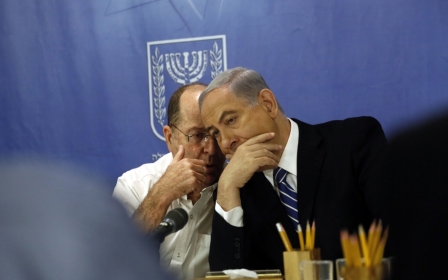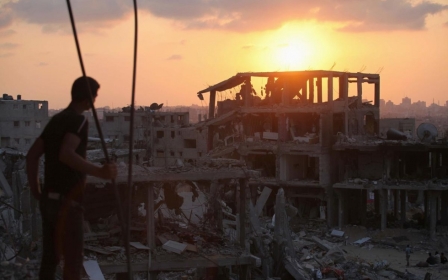Hamas boosted politically despite Gaza losses

Gaza's Hamas movement may have suffered heavy military losses during 50 days of conflict with Israel but it emerged with its political standing enhanced, analysts say.
After the ceasefire last week between Israel and Palestinian groups in Gaza, Hamas leaders celebrated "victory" to the cheers of crowds across the enclave.
Hamas leaders raised the prospect of opening up Gaza to the world, winning the applause of crowds keen to see an end to Israel's crippling blockade of the territory, in place since 2006.
Israeli officials boasted that they gave Hamas none of its key demands.
Talks on opening air and sea ports have been suspended pending future negotiations and the two land crossings with Israel still only let a trickle of Gazans through.
But analysts say that simply by surviving in the face of the fierce Israeli onslaught, Hamas has cemented its position.
"No political, security or national decisions can (now) be taken without it," said analyst Hani Habib.
"Simply not being defeated represents a symbolic victory, considering the overwhelming disproportion of strength" between Israel and Hamas, said Middle East specialist Karim Bitar.
Israel's offensive killed 2,143 Palestinians, wounded 11,000 and forced some 500,000 from their homes, more than a quarter of the population.
The conflict also cost Hamas "5,000 of its rockets, around half of its arsenal," said Mukhaimer Abu Saada, a professor of political science at Gaza's Al-Azhar University, but it was a key show of strength for the movement.
Walid Mudalal, a Gazan political analyst, said Hamas's refusal to surrender broadcast to the world "the idea that the only possible solution is political, by showing its striking force against Israel".
With 66 soldiers killed in the conflict, Israel suffered its worst battlefield losses since the 2006 war against Lebanon's Hezbollah.
The negotiations in Cairo that led to the ceasefire also boosted Hamas's standing on the international stage.
When the Egyptian army toppled the country's first democratically elected president Mohamed Morsi last July, Hamas lost a key ally and its regional prestige took a major dent.
The military-installed authorities in Cairo cracked down on the tunnels linking Gaza to Egypt, further isolating Hamas.
But in giving voice to the Palestinians' demands at talks in Cairo, Hamas managed to curb its regional "demonisation", Mudalal said.
Since its reconciliation in April with president Mahmud Abbas's Palestine Liberation Organisation, Hamas has returned to the forefront of the Palestinian political arena.
Hamas, like Islamic Jihad which fought alongside it, has vowed to rearm, defying calls from Israel for the demilitarisation of Gaza.
But analysts say it will take more than new arms for Hamas to keep gaining strength and that the movement will need to prove it can also press for concessions from Israel.
Abaher al-Saka, of Bir Zeit University in the West Bank, said that Hamas's continued popularity depends on "improvements in living conditions, particularly the return of power supplies and the opening of border crossings".
"If Israel does not play the game, discontent with Hamas will rise," he warned.
PA to pay Hamas staff 'as soon as possible'
Meanwhile, the Palestinian Authority will pay its employees' August salaries on time and Hamas civil servants in Gaza "as soon as possible", a spokesman for the unity government said Saturday.
Saturday's move comes after a row over pay erupted between the two Palestinian factions in June when the PA's Gaza-based staff received their wages but their Hamas counterparts went empty-handed.
"The salaries of the civil servants with the Authority will be paid next week and the government is trying to pay those of Hamas as soon as possible," government spokesman Ihab Bseiso told AFP.
Under a reconciliation deal signed in April with the PLO, Hamas disbanded its Gaza government.
Since then Hams has insisted that the PA should pay the salaries of the movement's 42,000 civil servants.
The PA refused to pay the officials in June because they were appointed after Hamas ousted bitter rivals Fatah -- which dominates the PLO -- from Gaza in 2007.
The pay row was the first challenge to the new Palestinian unity government, formed to try to end years of Palestinian rivalry, and Qatar stepped in to cover the costs to former Hamas employees.
A Palestinian official speaking on condition of anonymity said the PA will have to ensure the payments do not jeopardise international aid.
After Hamas civil servants failed to receive their salaries in June, gunmen attacked banks in Gaza, forcing Hamas to close them for six days.
It was then that Qatar -- a main Hamas ally -- intervened, saying it would contribute a total of $60 million (44 million euros).
The payments from Doha were then hit by the seven-week Israeli military assault that was launched on July 8.
Bseiso said 177,000 civil servants were registered with the Authority -- 70,000 in Gaza and 107,000 in the West Bank.
Each month, their salaries cost around $200 million, $120 million of which is covered by taxes collected by Israel on behalf of the Palestinian territories, he said.
Some $57 million comes from the Palestinian budget and $35 million from international aid, the spokesman added.
New MEE newsletter: Jerusalem Dispatch
Sign up to get the latest insights and analysis on Israel-Palestine, alongside Turkey Unpacked and other MEE newsletters
Middle East Eye delivers independent and unrivalled coverage and analysis of the Middle East, North Africa and beyond. To learn more about republishing this content and the associated fees, please fill out this form. More about MEE can be found here.




